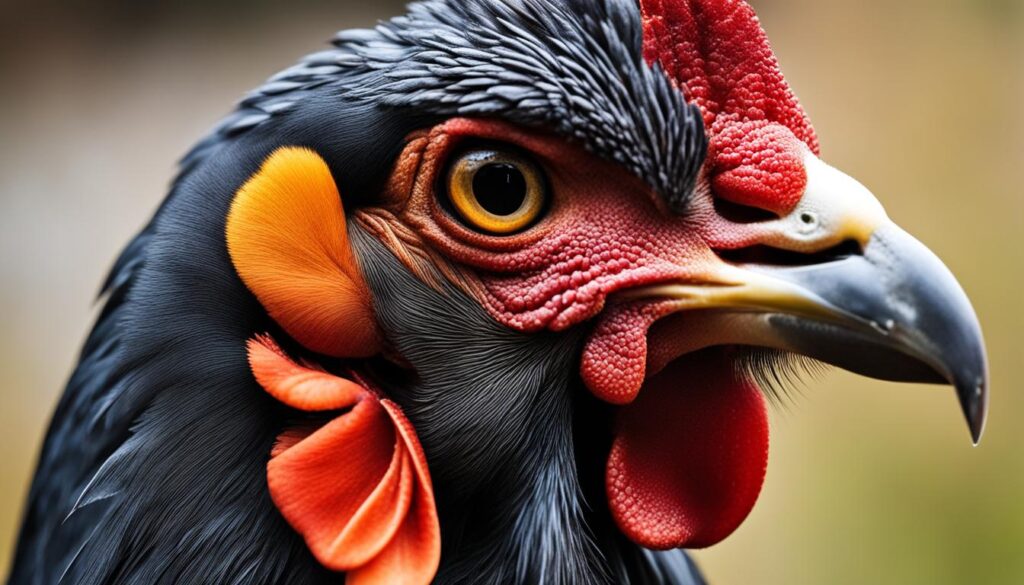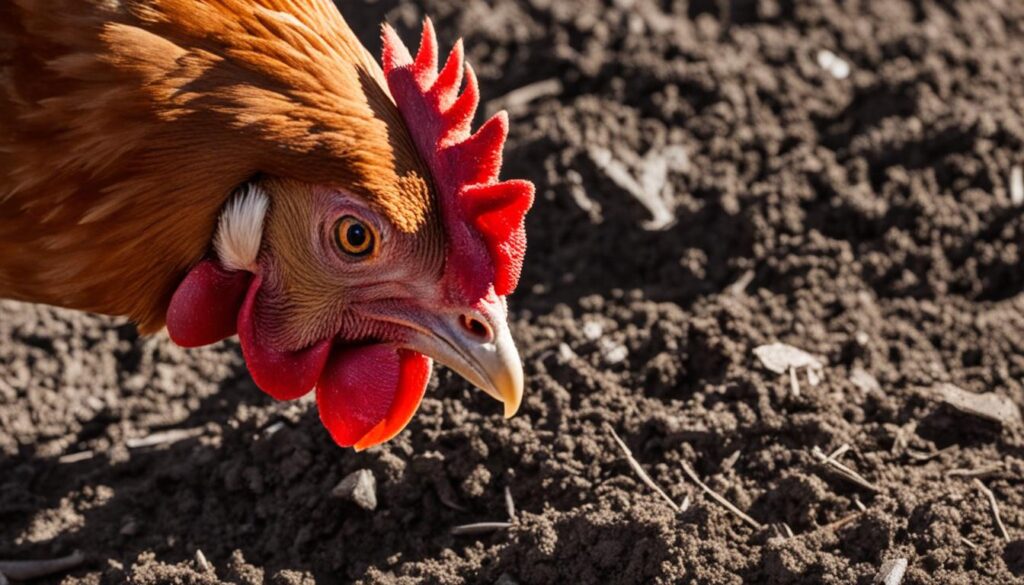Have you ever watched your flock peck and nuzzle the earth, leaving you to wonder about this peculiar pastime? My time with our feathered friends has piqued my curiosity about chickens scratching behavior and led me to explore the nuances behind this act. As someone deeply invested in backyard chicken care, I know that delving into the whys of such behaviors isn’t just about satisfying curiosity—it’s about enhancing our poultry keeping insights. Join me as we unearth the reasons why do chickens rub their beaks on the ground, an activity as natural to them as the dawn chorus.
Natural Behaviors: The Instincts Behind the Scratching
Key Takeaways
- Discovering the practical reasons behind chickens’ ground-scratching.
- Understanding this behavior’s role in foraging and self-maintenance.
- Recognizing the connection between scratching and overall poultry health.
- Learning when scratching may point to underlying issues in a flock.
- Planning the best backyard environment to support natural chicken activities.
Natural Behaviors: The Instincts Behind the Scratching
Witnessing the routine actions of chickens can reveal a world of instinctive behaviors that are key to their survival and well-being. From why chickens scrape their beaks against the ground to the peculiar sight of a chicken taking a dust bath, these activities are rooted in their very nature. Let’s delve into the fascinating reasons behind some of their most characteristic behaviors, providing insights from both scientific perspectives and my personal observations from years tending to a backyard flock.
Foraging for Food: How Scratching Helps Chickens Hunt
One of the most observable chicken instinctive behaviors is their methodical scratching of the earth. This behavior is not merely a display of restlessness but a strategic foraging technique. By using their feet to scrape and dig into the soil, chickens uncover hidden delicacies such as insects, seeds, and other edible morsels. Their keen eyesight and sharp beaks play a vital role as they peck with precision at these newfound treats, gaining the necessary nutrients for their health.
Dirt Baths: Cleaning and Maintaining Feathers
Feather maintenance is critical for chickens, and dirt baths are their natural method for achieving this. The sight of chickens rolling, shaking, and fluffing themselves in the dust may appear peculiar at first glance. However, this practice is essential for their hygiene. The dust helps to absorb excess oil, cleanse the feathers, and prevent parasites. By engaging in this behavior, chickens ensure that their plumage remains in prime condition, aiding in insulation and flight.
Sharpening Beaks: The Need for a Sharp Beak in Nature
The necessity of a sharp beak is often understated when discussing poultry care. A chicken’s beak is a multipurpose tool used for feeding, pecking in social interactions, and self-defense. Beak sharpening techniques are naturally ingrained in chickens, which often leads them to scrape their beaks on hard surfaces such as rocks, or in this case, the ground. This behavior helps to keep their beaks in top form, ensuring they are prepared for all that their environment may challenge them with.
Why Do Chickens Scratch Their Beaks on the Ground: Unpacking the Habit
As a hobby farmer, I’ve often observed the intriguing behavior of chickens as they engage in various activities throughout their day. One of the activities that fascinate me the most is why do chickens wipe their beaks on the ground. After spending countless hours with my feathered friends, I’ve come to appreciate this action as a crucial aspect of chicken beak health and a reflection of their avian natural behavior. Let’s delve into the reasons behind this practice and its importance.
Initially, it may seem like a simple cleaning gesture, but it’s actually an essential routine for a chicken’s wellbeing. When chickens wipe their beaks on the ground, they are not only removing food remnants but also engaging in an act that helps to keep their beaks sharp and in good condition. This behavior, deeply rooted in their instincts, replicates the natural actions of their wild ancestors.
- The act of beak wiping helps to wear down the beak naturally, which can prevent overgrowth issues.
- It also assists in the removal of parasites that might be clinging to the beak or face.
- Additionally, this behavior is sometimes a way for chickens to mark their territory with scent glands located in the beak.
Evidence of the significance of these behaviours is abundant when observing chickens in a more naturalized setting. For instance, after a meal, you might notice that a chicken will almost immediately start to rub its beak back and forth on the ground or on a hard surface. This is a bird’s way of ensuring that their primary tool for foraging and eating remains in top condition.
Understanding the nuances of chicken behavior not only enriches our experience as poultry keepers but also empowers us to provide better care for these fascinating birds.
Another interesting observation is the material chickens choose to rub their beaks on. Different surfaces offer varied degrees of abrasiveness, which they seem to select based on the condition of their beak. I’ve noted my chickens showing a preference for rough surfaces such as rocks, bricks, or concrete edges over softer ground when they have bits of tough food to remove or when their beak appears to require more rigorous maintenance.
In summary, this habitual beak rubbing is not mere happenstance; it’s an evolved behavior pivotal to a chicken’s daily routine. It ensures their beak is sharp for foraging, contributes to their hygiene, and serves as an instrument for their intricate social interactions. It’s behaviors like this that remind us how complex and adapted chickens are to their environments.

Health and Well-being: The Benefits of Beak Scratching
As a hobby farmer deeply immersed in the care and understanding of my flock, I’ve observed numerous activities that speak volumes about the health of my chickens. One such activity is the often understated action of a chicken rubbing its beak on ground. It’s not just a pastime; this behavior is pivotal for their health and contentment.
Parasite Prevention: Keeping Lice and Mites at Bay
Poultry parasite control is a critical aspect of chicken health management. When our feathered friends engage in beak scratching against the earth, they’re often helping to dislodge and reduce lice and mite populations that can cling to their heads and neck areas. This natural behavior, paired with a well-maintained coop, can significantly minimize the prevalence of such pesky parasites.
Beak Condition: Preventing Overgrowth and Maintaining Shape
Many new chicken keepers may resort to beak trimming as a solution to overgrowth, but this could be unnecessary with proper beak care. Beak scratching naturally files down their beaks, keeping them in good shape and function. It’s a humane and stress-free beak trimming alternative that also allows chickens to retain their beaks’ natural functions and sensitivity.
Stress Relief: Behavioral Indicators and Their Importance
Recognizing chicken stress behaviors is crucial for their overall welfare. When a chicken is frequently rubbing its beak, it might also be an indication they are comforting themselves. It’s akin to a cat purring, a sign of contentment but also self-soothing during times of low-level stress. Monitoring these behaviors can give us invaluable insights into our chickens’ mental state.
| Behavior | Health Benefit | Significance |
|---|---|---|
| Beak rubbing on ground | Parasite removal | Reduces the need for chemical treatments |
| Natural beak maintenance | Prevents overgrowth | Eliminates the stress of human-imposed beak trimming |
| Self-soothing action | Stress relief | Indicates comfort levels and well-being |
Through close observation and a little intuitive understanding, facilitating a conducive environment for such beneficial behaviors becomes not just a possibility, but a rewarding aspect of ethical poultry farming. Let’s cherish these natural habits that provide a window into the well-being of our cherished flocks.
Observing Your Flock: When Scratching May Indicate a Problem
As I’ve come to learn through years of tending to my own chickens, observing the subtle behaviors within your flock can be key to ensuring their health and happiness. While a certain amount of scratching is perfectly normal and even beneficial, there are times when it could signify something more worrisome. In this section, I’ll share insights on distinguishing these instances and responding effectively to ensure the wellbeing of your chickens.

Excessive Scratching: Recognizing Abnormal Behaviors
Firstly, let’s talk about **abnormal chicken beak activity**. Excessive and frantic scratching, particularly when paired with other signs of distress, can be a clear indicator that your chicken is not simply engaging in routine beak sharpening or foraging behavior. If you notice chickens consistently rubbing their beaks more than usual, it could point to discomfort or even an underlying health issue.
Identifying Illness: Signs to Watch Out for in Your Chickens
- Lethargy or reduced activity
- Changes in eating or drinking habits
- Unusual droppings
- Ruffled feathers or changes in appearance
- Audible signs of distress such as persistent squawking or groaning
Any combination of these **signs of sick chickens** alongside unusual beak scratching should prompt a closer examination and, possibly, consultation with a veterinarian.
Environmental Factors: How Your Chicken’s Habitat Influences Behavior
The **impact of habitat on chicken behavior** cannot be overstated. A subpar living environment can lead to stress behaviors in chickens, including excessive beak rubbing. Consider if your chickens have enough space, proper nutrition, and a secure, clean, and enriching habitat. The conditions in which your chickens live can dramatically affect their health and actions.
What’s key is maintaining a vigilance towards these behaviors. It’s not just about noticing them but also about understanding when they move from the realm of the ordinary to being **excessive beak rubbing concerns** for the flock’s wellbeing. In the next section, we’ll discuss actionable steps you can take to enhance your backyard habitat to enrich the lives of your chickens and encourage healthful behaviors.
Improving Backyard Habitats: Ensuring a Healthy Scratching Environment
When I glance out at my flock scratching contentedly in their backyard abode, I take pride in knowing I’ve created an environment that not only supports their natural behaviors but elevates their well-being. Ensuring a healthy scratching environment is vital for our feathered friends, and I want to share some strategies that have proven successful in enhancing chicken habitats.
An optimal poultry environment closely mimics the varied terrain they would encounter in the wild. This means providing areas with a mix of soft earth for digging, patches of lush vegetation for exploration, and sturdy perches for rest. In my experience, a dynamic backyard setup for chickens should offer both sheltered spaces and open areas to encourage a full spectrum of chicken activities, from foraging to dust bathing.
It’s thrilling to watch as my birds express their instincts fully, a clear sign of a life well-lived within the safe bounds of the coop. By promoting natural chicken behaviors, you’ll notice not just happier chickens but also a significant decrease in behavioral issues. As we conclude this guide, remember that a little observation and thoughtful modification of your backyard habitat can have a profound impact on your flock’s health and happiness. I’ve personally seen the difference it makes and encourage you to embark on this rewarding journey.
